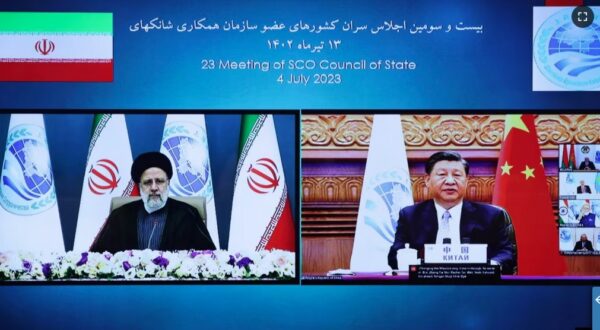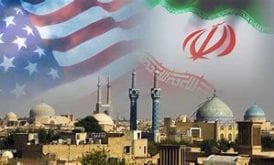voanews – Iran got a small measure of relief from its isolation by the West this month by joining the Shanghai Cooperation Organization of Eurasian nations. But analysts based in Iran and the U.S. say Tehran faces significant obstacles to benefit from its SCO membership.
Tehran became the SCO’s ninth member on July 4, when Iranian President Ebrahim Raisi participated in a virtual SCO summit hosted by India. It was an upgrade from the observer status that Iran had held with the group since 2005. Along with India, the other SCO members are China, Russia, Kazakhstan, Kyrgyzstan, Tajikistan, Uzbekistan and Pakistan.
A day after Iran joined, Iranian state-approved news sites published commentaries by two Iranian international affairs experts who said that before Tehran can enjoy any economic benefits as an SCO member, it must overcome multiple domestic hurdles.
“Iran must be able to supply goods and products with competitive characteristics to the market of other countries,” Vahid Shaqaqi-Shahri told the Mizan news agency of the Iranian judiciary. He said such competitiveness was necessary for Iran to achieve balanced trade with other SCO members, which would in turn enable them to switch from trading in U.S. dollars to using their own currencies.
Iran has sought to reduce its reliance on the dollar in response to U.S. and EU sanctions imposed on the Iranian banking system in recent years. Those sanctions have hampered Iran’s ability to conduct international trade, much of which is denominated in dollars.
Another expert, Abolfazl Zohrehvand, told the Hamshahri Online news site that the Iranian government should closely monitor and consider adopting the common customs standards and regulations of SCO members. “We hope the government takes these basic steps … to support the private sector … to benefit from the situation,” Zohrehvand said.
Acknowledging that such progress is unlikely anytime soon, the semi-official Tasnim news agency published a July 10 article quoting the president of the Iran-China Chamber of Commerce and Industries, Majidreza Hariri, as saying “we should not look for immediate benefits from joining this organization, such as a drop in the dollar’s value
[against the Iranian rial].” He added that economic gains would take “a long time” to materialize.
Another obstacle to Iran benefiting from the SCO is the structure of the organization itself, as Harvard Kennedy School international security researcher Nicole Grajewski told VOA’s Flashpoint Iran podcast. Grajewski is the author of a report, “Iran and the SCO: The Quest for Legitimacy and Regime Preservation,” published last month in academic peer-reviewed journal Middle East Policy.
The following transcript of Grajewski’s July 6 interview has been edited for brevity and clarity.
VOA: What are the main benefits to Iran of being in this organization?
Nicole Grajewski, Harvard Kennedy School: In terms of benefits, the SCO offers very little. It is not like NATO or the European Union, where members enjoy certain privileges such as mutual defense or economic integration. The SCO really functions as a kind of ad hoc organization that meets with several forums.
On the sidelines [of those forums], Iran has the opportunity to engage with a lot of Central Asian states, Russia, China, India and Pakistan. But in terms of the actual institutional benefits [from the SCO], they are quite marginal.
There are some dimensions of the SCO related to regime security that Iran may benefit from. The SCO maintains a list of outlawed organizations that fall under the three evils, as [SCO members] say: terrorism, extremism and separatism. In essence, all states of the SCO have to recognize those groups as outlawed organizations.
VOA: Iran has been associated with the SCO for quite some time before becoming a full member. What has that engagement looked like in practice?
Grajewski: Engagement in the SCO, because it is not as robust an institution as many of its European equivalents, is based on foreign ministers of the respective countries meeting and planning what the discussions will be at the big annual summit. This summit consists of a plenary session where leaders vote on various proposals that were discussed beforehand.
Observer states do not have the opportunity to vote on resolutions or initiatives that the SCO is pushing. Now Iran can do that [as a member]. Also, the SCO is governed by consensus. That means all member states essentially have to agree on whatever goes forward. So Iran will have that ability as well.
But there is no formal mechanism beyond the SCO plenary session that allows members to coordinate.
VOA: You have written that Iran benefits from association with the SCO in terms of political solidarity with other members. How does that solidarity help it to withstand Western pressure?
Grajewski: For a lot of SCO states, whenever there is any kind of [external] interference in their domestic affairs, they will come out and say that this [perceived interference] is against SCO principles and tout that narrative.
Iran benefited from that prior to its membership in the SCO. During [Iran’s 2009] Green Movement [antigovernment protests], the SCO was resolute, mostly led by Russia and Tajikistan, in coming out and saying that the protests were an external interference [in Iran’s affairs].
The SCO also has been supportive of a diplomatic solution to the Iranian nuclear issue. The SCO came out in support of the negotiations that led to [the 2015 Iran nuclear deal known as] the Joint Comprehensive Plan of Action.
So the SCO provides Iran with [diplomatic] cover for some of its affairs. But this is not always translated into policy. In many ways, the solidarity is virtual and without much substance.
VOA: What do other SCO members get out of Iran being admitted into their club?
Grajewski: The organization has lost a lot of its significance, partly because of disagreements between Russia and China over the fate of the organization, and also because of the inclusion of Indian and Pakistan [in 2017], which really made it less of a cohesive bloc.
Iran’s membership in some ways is symbolic. It lets the organization say that it has a wider geographic reach. Also, a lot of SCO member states’ narratives about the organization point to its potential for economic connectivity, and Iran is a huge node in that. In addition, Iran has experience fighting domestic separatist groups and conducting
counterterrorism operations. Some of these capacities could be important [to other SCO members].
But this is not the same as a new country joining the European Union, in which case there would be actual economic benefits for the other member states. That, I think, is the real distinction. The SCO is not as robust or bureaucratic as other organizations.
 Shabtabnews In this dark night, I have lost my way – Arise from a corner, oh you the star of guidance.
Shabtabnews In this dark night, I have lost my way – Arise from a corner, oh you the star of guidance.



